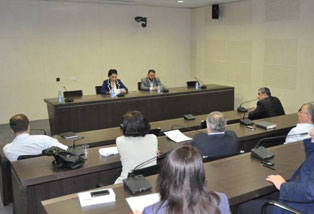At the July 11 sitting the members of the Committees for Human Rights and Civil Integration voted for the admission of draft law on amnesty for covert recordings and illegal wiretapping.
According to the draft bill the persons will be released from criminal responsibility in case, within one month from the day the law enters into force, they appear in front of investigative agencies and voluntarily deliver the recordings of personal correspondence, or post, conversation received or transmitted over the telephone or other technical means or the message received or transmitted via telegraph, fax or other technical means provisioned in Article 158 and 159 of the Criminal Code of Georgia or the copies of the aforementioned materials.
According to the official data received from the Parliament Committees for Human Rights and Civil Integration proposed the amnesty to embrace the obtaining and keeping of personal or family secrets envisaged in Article 157 of the Criminal Code. According to the Committee chairperson Eka Beselia clarified that along with illegally obtaining and keeping personal or family secrets Article 157 also implies spreading of such data, but according to her, in case of spreading these persons won’t be subject to amnesty.
According to the draft bill the amnesty will embrace the persons that committed the crime provisioned in Article 158 and Article 159 until December 31, 2012. The Committee meeting stressed that in case of the crime envisaged in Article 157 the amnesty will embrace the persons that obtained the material until July 1, 2013 an in case of keeping – until the law enters into force.
Article 158 provides for the disclosure of Secret of private conversation in particular illegal interception or wire interception of private conversation by using technical means. Article 159 provides for the illegal disclosure of the privacy of personal correspondence, or post,
conversation received or transmitted over the telephone or other technical means or the message received or transmitted via telegraph, fax or other technical means.
Following the Georgian Dream Coalition’s out-right victory in the Parliamentary Elections 2012 the governing power accused the previous government of total spying on opponents through video as well as audio equipments. Moreover, the Ministry of Internal Affairs made an official statement on holding 13 thousand audio and video files containing not only severe torture of inmates but private lives of political opponents, businessmen and journalists. At the same time the Interior Minister Irakli Gharibashvili said the copies of the footage are quite possible to be held by some unauthorized persons.
News
December 13, 2023
Ethnic minorities outside the peace dialogue
November 6, 2023
‘Peace’ agenda of political parties
Popular
Articles
February 13, 2024




